| Listing 1 - 7 of 7 |
Sort by
|
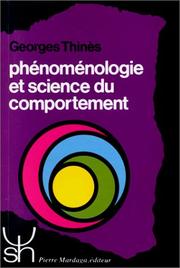
ISBN: 2870091303 9782870091302 Year: 1980 Volume: 94 Publisher: Bruxelles : Pierre Mardaga,
Abstract | Keywords | Export | Availability | Bookmark
 Loading...
Loading...Choose an application
- Reference Manager
- EndNote
- RefWorks (Direct export to RefWorks)
Psychology --- Comportement --- Fenomenologie --- Gedragswetenschap --- Phénoménologie --- Phenomenology --- Phenomenological psychology --- Psychologie phénoménologique --- Academic collection --- Phénoménologie --- Psychologie phénoménologique
Book
Year: 1980 Publisher: The Hague ; Boston, MA ; London : Martinus Nijhoff,
Abstract | Keywords | Export | Availability | Bookmark
 Loading...
Loading...Choose an application
- Reference Manager
- EndNote
- RefWorks (Direct export to RefWorks)
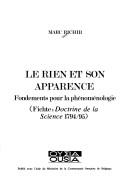
ISBN: 2870600011 9782870600016 Year: 1980 Volume: 1-2 Publisher: Bruxelles Ousia
Abstract | Keywords | Export | Availability | Bookmark
 Loading...
Loading...Choose an application
- Reference Manager
- EndNote
- RefWorks (Direct export to RefWorks)
Fenomenologie --- Neoplatonism --- Neoplatonisme --- Néo-platonisme --- Phénoménologie --- Truth --- Vérité --- Waarheid --- Fichte, Johann Gottlieb --- Fichte, Johann Gottlieb, --- Metaphysics --- Phenomenology --- Phénoménologie --- Plato --- Ontology --- History --- Heidegger, Martin --- Contributions in ontology --- Metafysica --- Phenomenology. --- Ontology.
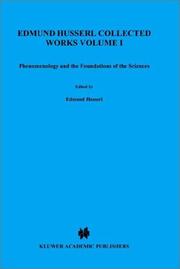
ISBN: 9024720931 9789024720934 Year: 1980 Volume: 1 Publisher: The Hague Nijhoff
Abstract | Keywords | Export | Availability | Bookmark
 Loading...
Loading...Choose an application
- Reference Manager
- EndNote
- RefWorks (Direct export to RefWorks)
Being --- Etre (Philosophie) --- Fenomenologie --- Fenomenologische psychologie --- Méthode phénoménologique (Psychologie) --- Ontologie --- Ontology --- Phenomenological psychology --- Phenomenology --- Phénoménologie --- Phénoménologie (Psychologie) --- Psychological phenomenology --- Psychologie phénoménologique --- Psychology [Phenomenological ] --- Zijn (Filosofie) --- Zijnsleer --- Science --- Philosophy --- -Natural science --- Science of science --- Sciences --- Philosophy, Modern --- Psychology, Phenomenological --- Existential psychology --- Personality --- Psychology --- Metaphysics --- Necessity (Philosophy) --- Substance (Philosophy) --- Ontology. --- Phenomenological psychology. --- Phenomenology. --- Philosophy. --- -Philosophy --- -Philosophy, Modern --- Natural science --- -Psychological phenomenology --- Normal science --- Philosophy of science --- Science - Philosophy
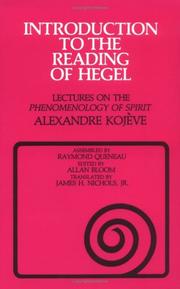
ISBN: 0801492033 9780801492037 Year: 1980 Publisher: Ithaca (N.Y.): Cornell university press
Abstract | Keywords | Export | Availability | Bookmark
 Loading...
Loading...Choose an application
- Reference Manager
- EndNote
- RefWorks (Direct export to RefWorks)
Hegel, Georg Wilhelm Friedrich --- Phénoménologie. --- Dialectique. --- Phänomenologie des Geistes (Hegel) --- Phänomenologie des Geistes --- Hegel, Georg Wilhelm Friedrich, --- Hegel, Georg Wilhelm Friedrich (1770-1831). --- Et la mort. --- Phänomenologie des Geistes (Hegel, Georg Wilhelm Friedrich) --- Hegel, Giorgio Guglielmo Frederico --- Phänomenologie des Geistes (Hegel). --- Phänomenologie des Geistes. --- Phänomenologie des Geistes (Hegel, Georg Wilhelm Friedrich).
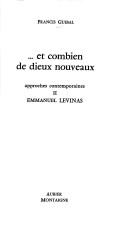
ISBN: 2700701879 9782700701876 Year: 1980 Publisher: Paris Aubier Montaigne
Abstract | Keywords | Export | Availability | Bookmark
 Loading...
Loading...Choose an application
- Reference Manager
- EndNote
- RefWorks (Direct export to RefWorks)
Levinas, Emmanuel --- Heidegger, Martin --- Heidegger, Martin, --- Heidegger, Martin (1889-1976) --- Levinas, Emmanuel (1906-1995) --- Phénoménologie --- Khaĭdegger, Martin, --- Haĭdegger, Martin, --- Hīdajar, Mārtin, --- Hai-te-ko, --- Haidegŏ, --- Chaitenger, Martinos, --- Chaitenker, Martinos, --- Chaintenger, Martin, --- Khaĭdeger, Martin, --- Hai-te-ko-erh, --- Haideger, Marṭinn, --- Heidegger, M. --- Haideger, Martin, --- Hajdeger, Martin, --- הייגדר, מרתין --- היידגר, מרטין --- היידגר, מרטין, --- 海德格尔, --- Chaintenker, Martin, --- Hāydigir, Mārtīn, --- Hīdigir, Mārtīn, --- هاىدگر, مارتين, --- هىدگر, مارتين, --- Heidegger, Martin, - 1889-1976
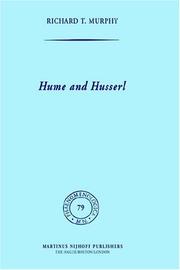
ISBN: 9024721725 9048182581 9401743924 9789024721726 Year: 1980 Volume: 79 Publisher: The Hague: Nijhoff,
Abstract | Keywords | Export | Availability | Bookmark
 Loading...
Loading...Choose an application
- Reference Manager
- EndNote
- RefWorks (Direct export to RefWorks)
To become fully aware of the original and radical character of his transcendental phenomenology Edmund Husserl must be located within the historical tradition of Western philosophy. Although he was not a historian of philosophy, Husserl's his torical reflections convinced him that phenomenology is the necessary culmination of a centuries-old endeavor and the solution to the contemporary crisis in European science and European humanity itself.l This teleological viewpoint re quires the commentator to consider the tradition of Western philosophy from Husserl's own perspective. Husserl maintained that the Cartesian tum to the "Cogito" represents the crucial breakthrough in the historical advance of Western thought toward philosophy as rigorous science. Hence 2 he concentrated almost exclusively on the modem era. Much has been written of Husserl's relationship to Descartes, Kant, and the neo-Kantians. His connections with Locke, Berkeley, and Hume have not been examined as closely despite his fre quent allusions to these British empiricists. Among these thinkers David Hume gained from Husserl the more extensive considera tion. Commentators have pointed out correctly that Husserl always criticized unsparingly Hume's sheer empiricistic approach to the problem of cognition. Such an approach, in Husserl's view, can only result in the "naturalization of consciousness" from which stem that "psychologism" and "sensualism" which lead Hume inevitably into the contradictory impasse of solipsism 3 and skepticism.
Theory of knowledge --- Husserl, Edmund --- Hume, David --- Knowledge, Theory of --- Subjectivity --- Phenomenology --- A priori --- Constitution (Philosophy) --- Théorie de la connaissance --- Subjectivité --- Phénoménologie --- Constitution (Philosophie) --- Hume, David, --- Husserl, Edmund, --- Contributions in theory of knowledge --- 1 HUME, DAVID --- Academic collection --- #GROL:SEMI-1-05'19' Huss --- Subjectivism --- Relativity --- Philosophy, Modern --- Epistemology --- Philosophy --- Psychology --- Apriori --- Logic --- Reasoning --- Filosofie. Psychologie--HUME, DAVID --- -Husserl, Edmund --- -ヒューム --- A priori. --- Knowledge, Theory of. --- Phenomenology. --- Subjectivity. --- 1 HUME, DAVID Filosofie. Psychologie--HUME, DAVID --- -Contributions in theory of knowledge --- Constitution (Philosophy). --- Théorie de la connaissance --- Subjectivité --- Phénoménologie --- Husserl, Edmond --- Contributions in theory of knowledge. --- Hume, David, - 1711-1776 --- Husserl, Edmund, - 1859-1938
| Listing 1 - 7 of 7 |
Sort by
|

 Search
Search Feedback
Feedback About
About Help
Help News
News